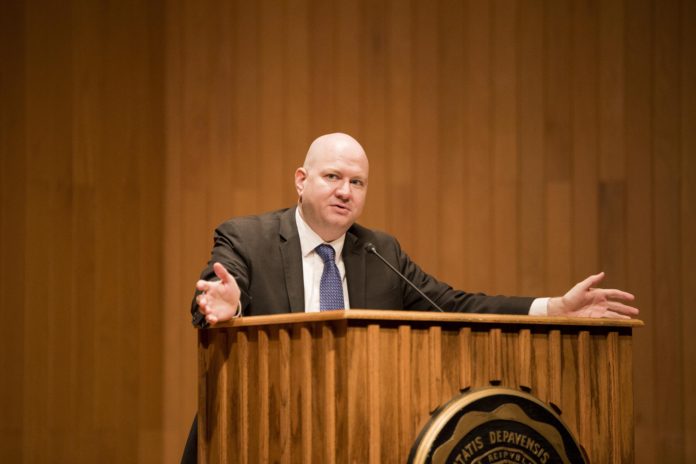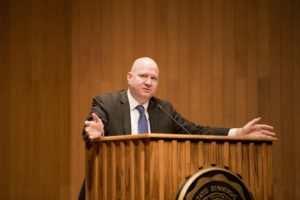

Daniel McCarthy, editor of the nonprofit publication “The American Conservative,” spoke about the state of conservatism in the United States at a lecture last Thursday in Thompson Hall.
“[Donald] Trump represents not only a force that is winning at the moment but a force that, no matter what happens in November, even if he loses in a landslide, is likely to come back,” McCarthy said.
The Prindle Institute sponsored McCarthy’s lecture titled, “What a Post-Trump America means for Conservatism/Republicanism.” The presentation is a part of Prindle’s series on the ethics of voting.
The lack of one set definition for conservatism was a large topic of the conversation. According to McCarthy, “competition for what conservatism means and for what the political right means in America,” is responsible for Republican presidential nominee Donald Trump’s popularity.
McCarthy spoke about how this election demonstrated a new perspective on the idea of conservatism in America. “This is a pivotal election, one that is redefining American conservatism and the right,” McCarthy said.
McCarthy’s speech worked to identify the forces fighting to define conservatism in modern politics.
The first of these forces is non-ideological conservatism, which has less practical application and is of a more philosophical dimension.
Another is ideological conservatism which was brought to power by the “The National Review” and the Barry Goldwater campaign. This ideology revolves around free markets, but also focuses on taxes and economic regulation. In addition, there is a focus on military commitment to respond to international threats.
The third element to conservatism is “the right,” which McCarthy described as a reaction to the idea of “the left.” It is emotional, psychological, and “fundamentally defines itself around the question of what it means to be us, which leads it to be nationalistic and rather sectarian,” McCarthy said.
He went on to explain that it operates under the assumption that “the left” wants to transfigure the United States and erase the identity of “the right,” and was redefined by its opposition to the movements of the 1960’s.
The rise of Trump indicates that ideological conservatism and “the right” have not only diverged, but that “the right” has gained more control nationally. McCarthy believes this is because “the left” has accepted the classical liberal economic theory common among ideological conservatives. “The Democratic Party has made its peace with capitalism,” McCarthy said, “(Both) parties now favor free-trade and rather low taxes (by historical standards).”
This cohesion and discontent with past conservative economics and foreign policy has lead Americans to reject ideological conservatism and instead turn to the rhetoric of “the right,” according to McCarthy.
“Trump’s support includes people who are very critical of the sects of the national governing class and the elite leaders of the country in academia, in the media, and even in both political parties,” McCarthy said. The Conservative Party’s split, in McCarthy’s eyes, will not allow the conservatives, including “the right,” to win this election.
Despite the sects differences, McCarthy posed the question of whether the groups could come together and integrate Trump after the election.
Some students were interested in the speech, but the event was attended by a mere 30 people. Sophomore Connor Berry said that he “doesn’t get a lot of conservative views on campus” and that DePauw has a lack of “good conservative speakers.”
Director of Prindle, Andrew Cullison, noted the lack of discussion centered around the core ideas of conservatism and liberalism throughout this election. He invited McCarthy to speak, after seeing how the American Conservative was “presenting rational arguments based on some background principals about how government ought to run, which is how political discussions ought to go,” said Cullison.
The lecturer brought in a wide range of perspectives. “I was really interested in learning about conservatism,” said Kiara Goodwine, a sophomore, “As a liberal, I’m not familiar with the issues within conservatism and I was really excited to learn more.”
